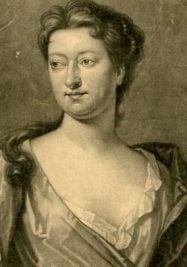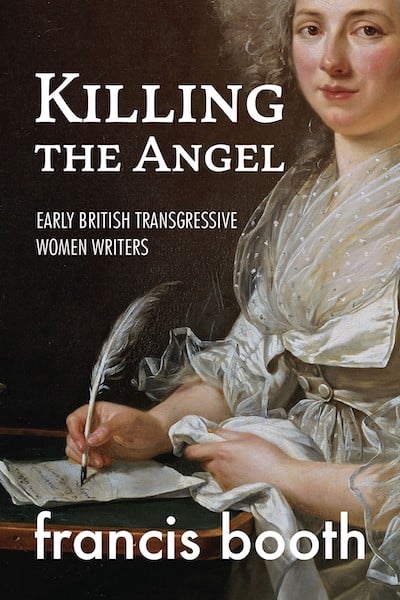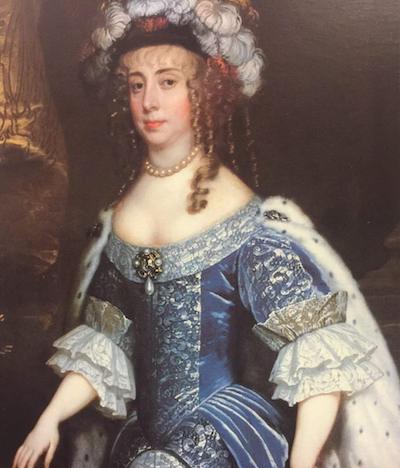Susanna Centlivre, English Poet and Playwright
By Francis Booth | On March 1, 2021 | Updated August 17, 2022 | Comments (0)

This introduction to Susanna Centlivre (1669 – 1723), the English poet, playwright, and actress, is excerpted from Killing the Angel: Early British Transgressive Women Writers ©2021 by Francis Booth. Reprinted by permission:
Very much as Virginia Woolf wrote about Aphra Behn, the anonymous author of the introduction to Susanna Centlivre’s collected works wished that Centlivre had been buried as a national treasure in Westminster Abbey.
To entertain this bustling busy Age,
Our Author now brings Business on the Stage;
She plots, contrives, embroils, foments Confusion,
And yet to Politicks makes not the least Allusion.
— Susanna Centlivre, Prologue to The Perplex’d Lovers
A prolific & successful female playwright
Aphra Behn’s reputation was, as Woolf said, a major bar to later women making a living as a playwright but not a complete one: the poet, actor and prolific playwright Susanna Centlivre, née Freeman and known professionally as Susanna Carroll, was said to be financially the most successful female playwright of the eighteenth century, even more than Behn herself.
Be it known that the Person with Pen in Hand is no other than a Woman, not a little piqued to find that neither the Nobility nor Commonalty of the Year 1722, had Spirit enough to erect in Westminster Abbey, a monument justly due to the Manes of the never to be forgotten Mrs Centlivre.
Between 1700 and 1723 she wrote nineteen plays, some of which had long and successful stage careers. In the preface to her most successful play The Busie Body, 1709, Centlivre respectfully addresses the Lord President of the Privy council, as was customary and she does it with the customary combination of self-deprecation and grovelling.
May it please Your Lordship,
As it’s an Established Custom in these latter Ages, for all Writers, particularly the Poetical, to shelter their Productions under the Protection of the most Distinguished, whose Approbation produces a kind of Inspiration, much superior to that which the Heathenish Poets pretended to derive from their Fictitious Apollo: So it was my Ambition to Address one of my weak Performances to Your Lordship, who, by Universal Consent, are justly allowed to be the best Judge of all kinds of Writing.
. . . . . . . . . . .

. . . . . . . . . . .
However, towards the end of all this obsequiousness Centlivre suddenly switches tack, pleading feminine inadequacies, implying that all the foregoing had perhaps been intended ironically and that she is here slyly transgressing the norms of these fawning dedications to pompous men.
And here, my Lord, the Occasion seems fair for me to engage in a Panegyric upon those Natural and Acquired Abilities, which so brightly Adorn your Person: But I shall resist that Temptation, being conscious of the Inequality of a Female Pen to so Masculine an Attempt; and having no other Ambition, than to Subscribe myself, My Lord,
Your Lordship’s Most Humble and
Most Obedient Servant,
Susanna Centlivre.
. . . . . . . . . . .

Killing the Angel on Amazon US*
Killing the Angel on Amazon UK*
. . . . . . . . . . .
Husbands in life and onstage
Not much is known about Centlivre’s early life but it is likely that her father died early, her mother remarried, then also died, after which stepfather died too. She probably then left home to join a company of strolling actors at around the age of fifteen, playing breeches roles – the male parts – and marrying another actor at the age of sixteen. He died less than a year later, she married again, an army officer named Carroll, but he died in a duel year after that.
Then, while performing at Windsor Castle, she met Joseph Centlivre and married him, though he was only a cook in the Castle kitchen. This one seems to have lived rather longer than the previous two, but presumably Susanna needed the money from her writing to sustain them.
In the play The Perjur’d Husband, 1700, Centlivre playfully subverts with the conventions of male characters complaining about women; her characters say the same things about the joy of being free from women as those in male-authored plays but they can be read as ironic because they were written by a woman.
Oh! happy he
Who lives secure and free from Love’s Alarms.
But happier far, who, Master of himself,
Ranges abroad without that Clog, a Wife.
Oh! rigorous Laws imposed on Free-born Man!
On Man, by bounteous Nature first designed
The Sovereign Lord of all the Universe!
Why must his generous Passion thus be starved,
And be confined to one alone?
The Woman, whom Heaven sent as a Relief,
To ease the Burden of a tedious Life,
And be enjoyed when summoned by Desire,
Is now become the Tyrant of our Fates.
. . . . . . . . . . .

. . . . . . . . . . .
Plays continued to be performed beyond her lifetime
Centlivre’s plays continued to be popular and were performed regularly until well after her death; in 1762 her collected works were published in three volumes. However, in the introduction (written by an anonymous woman) it is made clear that audiences initially stayed away from her plays, knowing they were by a woman; only when word of mouth spread did the audiences increase.
Her play of the Busy Body, when known to be the Work of a Woman, scarce defrayed the expenses of the First Night. The thin Audience were pleased, and caused a full House the Second; the Third was crowded and so on to the Thirteenth, then it stopped, on account of the advanced season; but the following Winter successively, was acted by rival Players, both at Drury Lane, and at the Hay-Market Houses. See here the Effect of Prejudice, a Woman who did Honour to the Nation, suffered because she was a Woman. Are these things fit and becoming a free born People, who call themselves polite and civilised!
The author of the introduction is at pains to make sure that we understand the problems facing a woman writer at that time.
Some Authors have had a Shandeian Knack of ushering in their own Praises, sounding their own Trumpet, calling Absurdity Wit, and boasting when they ought to blush; but our Poetess had Modesty, the general Attendant of Merit. She was even ashamed to proclaim her own great Genius, probably because the Custom of the Times discountenanced poetical Excellence in a Female. The Gentlemen of the Quill published it not, perhaps envying her superior Talents; and her Bookseller, complying with national Prejudices, put a fictitious name to her Love’s Contrivance, through fear that the work should be condemned, if known to be Feminine.
. . . . . . . . . . .

You may also enjoy:
5 Early English Women Writers to Discover
. . . . . . . . . . .
Finding her own voice
Centlivre did blow her own trumpet on occasion though, and certainly knew the mechanics of playwriting; she refers to Aristotle’s three dramatic unities: time, space and action. Another early English author, Elizabeth Montagu, in her praise of Shakespeare, condemned French authors for sticking too closely to them.
Centlivre understands these things but also understands that audiences simply want entertainment, to suspend disbelief for an evening. In her Preface to Loves Contrivance, 1703, Centlivre makes it clear that she knows the classics but does not seek to emulate them.
Writing is a kind of Lottery in this fickle Age, and Dependence on the Stage as precarious as the Cast of a Die; the Chance may turn up, and a Man may write to please the Town, but ’tis uncertain, since we see our best Authors sometimes fail. The Critics cavil most about Decorums, and cry up Aristotle’s Rules as the most essential part of the Play. I own they are in the right of it; yet I dare venture a Wager they’ll never persuade the Town to be of their Opinion, which relishes nothing so well as Humour lightly tossed up with Wit, and dressed with Modesty and Air. . . This I dare engage, that the Town will ne’er be entertained with Plays according to the Method of the Ancients, till they exclude this Innovation of Wit and Humour, which yet I see no likelihood of doing.
More about Susanna Centlivre
. . . . . . . . . . .

You may also enjoy …
5 Early English Women Writers to Discover
The Matchless Orinda: Katherine Philips
Elizabeth Cary: Early English Poet, Dramatist, & Scholar
The Scandalous, Sexually Explicit Writings of Aphra Behn
Olympe de Gouges: An Introduction to Her Life and Work
Advice to Young Ladies on Reading Novels
Mary Sidney, Countess of Pembroke
Contributed by Francis Booth,* the author of several books on twentieth century culture:
Amongst Those Left: The British Experimental Novel 1940-1960 (published by Dalkey Archive); Everybody I Can Think of Ever: Meetings That Made the Avant-Garde; Girls in Bloom: Coming of Age in the Mid-Twentieth Century Woman’s Novel; Text Acts: Twentieth Century Literary Eroticism; and Comrades in Art: Revolutionary Art in America 1926-1938.
Francis has also published several novels: The Code 17 series, set in the Swinging London of the 1960s and featuring aristocratic spy Lady Laura Summers; Young adult fantasy series The Watchers; and Young adult fantasy novel Mirror Mirror. Francis lives on the South Coast of England. He is currently working on High Collars and Monocles: Interwar Novels by Female Couples.
. . . . . . . . . . .
*These are Amazon Affiliate links. If a product is purchased by linking through, Literary Ladies Guide receives a modest commission, which helps maintain our site and helps it to continue growing!
Leave a Reply